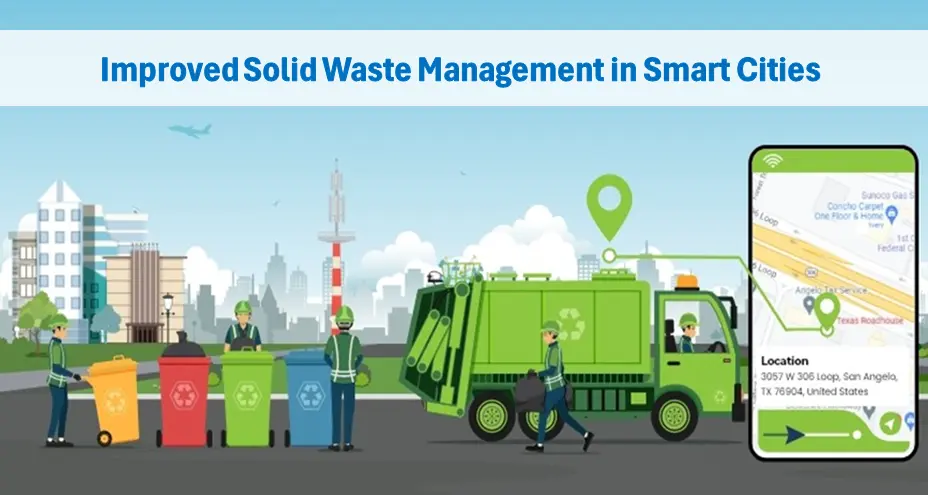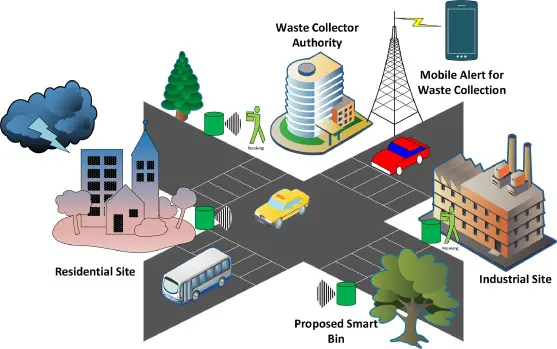Home » Improved Solid Waste Management in Smart Cities

In the twenty-first century, a number of key variables influencing social and environmental challenges include urbanization, resource constraint, and population expansion. Sustainable solutions and green initiatives are being adopted by numerous metropolitan areas. Cities are becoming more innovative and resource-efficient by leveraging technology to improve existing processes, making them smarter. Because of the growing population, trash production is currently vast and increasing swiftly.
Solid waste management is a biggest threat faced by the developed, under developed and developing countries like India. Day by day solid waste generation levels are increasing significantly because of population explosion, lifestyle habits, urbanization etc. Thus, growing number of cities and rapid growth in population demands higher efficiency in terms of resources to keep their cities clean. Waste management is a fundamental pillar of a smart city, within the public services.
The majority of garbage collection systems in use today are outdated and perform pick-ups that are either unneeded or happen late. Undue pickups result in a 70% rise in annual collection charges. Ineffective route planning causes traffic jams and raises the fuel requirements for carrying out the collections. The total carbon footprint rises by 50% as a result. Internet of Things (IoT) waste management technologies could help alleviate such issues by planning a garbage truck route that is more efficient. IoT sensor technology can be used to determine whether emptying waste containers is necessary. All citizens, businesses, and organizations can benefit from this adaptable and dynamic waste management system.

The waste management concept followed by smart cities is to curtail the large amount of waste production by creating awareness amongst people to follow the 4 R’s rule- rethink, reduce, reuse and recycle. This will help in waste production curtailment at the source. Management of urban waste is composed of different stages from collection, transportation, treatment and finally disposal. Out of these the collection of waste is the key factor to achieve efficient waste management system because of two reasons- cost and logistic development. The smart city concept integrates information and communication technology and various physical devices connected to the IOT network to optimize the efficiency of city operations and services and connect to the citizens.
ICT is used to enhance quality performance and interactivity of urban services to reduce costs and resource consumption and to increase contact between citizens and government. Smart city Technology has evolved together with the help of the Internet of Things (IOT) and Wireless Sensor Networks (WSN). The current state of Technology in the field of smart waste management involves the use of sensors that measure the fill level of trash bin.
There will be more chances in the near future to develop a smarter, greener city that contributes to a cleaner environment. A thorough waste management system is required to enhance the waste life cycle. In order to recover materials from our generated garbage and use it as a fresh resource to build new materials or items, collaboration from consumers, businesses, manufacturers, and recyclers is necessary.
Tips to Make Your Career in Architecture
From
Ar. Aditi Arora
HOD
School of Architecture and Planning
Lingaya’s Vidyapeeth
Best College in Delhi NCR for B.Arch
RECENT POSTS
CATEGORIES
TAGS
Agriculture Agriculture future AI Architecture Architecture design artificial intelligence BA Psychology BTech CSE BTech Engineering Business management career Career-Specific Education career guide Career Opportunities career option career scope Civil engineering commerce and management Computer Science Computer science engineering Data science degree education Engineering Engineering students English Literature english program Exam tips Fashion Design Fashion design course Higher Education Journalism journalism and mass communication law Law career Machine Learning MA Psychology Master degree mathematics MBA Mechanical Engineering Pharmacy Psychology Research and Development students
University Address: Nachauli, Jasana Road, Faridabad, Haryana
Toll Free: 1800-120-4613
Mobile : 8447744303 | 8447744304 | 8447744306 | 8447744309
Address: C-72, Second Floor, Shivalik, Near Malviya Nagar,
Above HDFC Bank, New Delhi 110017
Ph.No. - 011-46570515 / 45138169 / 41755703 / +91-7303152412
Jagmani Kutir, Ground Floor, Road No-1, Rajeev Nagar,
Near Darbar Marriage Hall, Patna-800024, Bihar
Contact No: 9818352069/ 8130120095
Mail: kanhaiya@lingayasvidyapeeth.edu.in
Copyrights © 1998 - 2025 Lingaya's Vidyapeeth (Deemed To Be University). All rights reserved.
It is important to note that the following email IDs and domains are fraudulent and do not belong to our university.
LV only conducts physical/online verification of any document related to examination on the following email id: